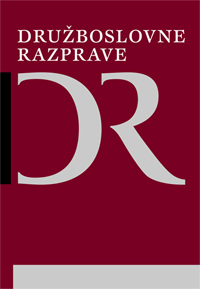Janez Pavel II. v deželi Maručinih kristalov
John Paul II. in the Land of Maruča's Crystals
Author(s): Marjan SmrkeSubject(s): Social Sciences
Published by: Slovensko sociološko društvo (in FDV)
Keywords: Catholic church; religion; superstition; postsocialism
Summary/Abstract: Prior to the visit of the head of the Roman Catholic Church (RCC) to Slovenia I established the following sociologically more important phenomena and processes in the "religious sphere": (1.) Various authors from the ranks of the RCC used the opportunity to reassess the past in order to denigrate the period of monopolistic rule by the communists and to play down (legitimise ideologically) the times when the RCC itself enjoyed a monopolistic position in society. Sociological analysis of Latin religious and cultural patterns (marked by the monopolistic position of the RCC) shows that it was precisely the religious and ideological monopoly of the RCC which generally led to social polarisation and confrontation, in some places also to left-wing secularist monopolies. (2.) Compared with other post-socialist countries with a predominantly catholic tradition present-day Slovenia is more resistant to the (social) re-catholicising pressures that appeared after the fall of the communist regime. This can be explained by the ("liberal") features of the communist rule in Slovenia (Yugoslavia), by the (negative) role of the RCC during the Second World War and especially by the changes in the religious structure of society. (3.) One of the key characteristics of the religious structure of Slovene society is the remarkable heterogeneity of the (declared) members of the RCC. Most of the RCC's declared members explain their "religiousness" (or even "non-religiousness") autonomously, in ways that have little do with the Church's doctrinal definition. According to the RCC's essential and central criterion for being a Catholic - that is belief in the resurrection - Slovenia is not a predominantly catholic country because most of the declared Catholics think differently. (4.) Slovenia is largely affected by contemporary "superstition". The extent of superstition exceeds the belief in Christian dogmas and the trend is rising. Declared "deeply religious" people are more "superstitious" (in non-Catholic way) than avowed non-believers. Those who are members of the RCC are less "superstitious" (in a non-Catholic way) than believers alienated from the Church. The established characteristics of "superstition" or its absence in Slovenia can be explained by the Catholic tradition and by the effects of the secularisation process.
Journal: Družboslovne razprave
- Issue Year: 12/1996
- Issue No: 21
- Page Range: 68-80
- Page Count: 13
- Language: Slovenian

